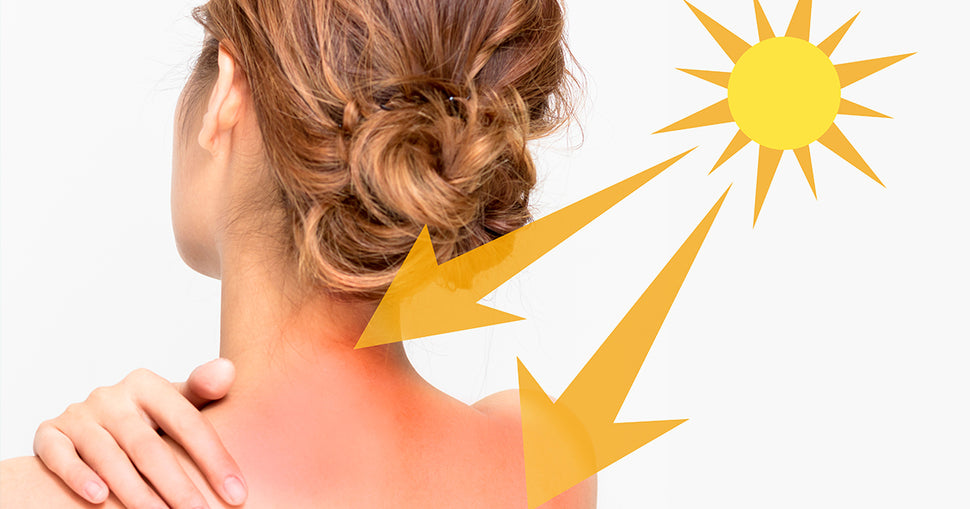Here's why you must not take sunburns lightly
02 Dec 2021
Most of us don’t take sunburns too seriously, because they largely tend to heal by themselves and don’t seem to cause too much damage to our bodies apart from a little discomfort. However, skin experts caution that this isn’t the best approach, as frequent and prolonged sunburns can lead to serious skin complications in the long run. Let’s look at what these are and how to get rid of sunburns.
Most of us don’t take sunburns too seriously, because they largely tend to heal by themselves and don’t seem to cause too much damage to our bodies apart from a little discomfort. However, skin experts caution that this isn’t the best approach, as frequent and prolonged sunburns can lead to serious skin complications in the long run. Let’s look at what these are and how to get rid of sunburns.
Sunburn symptoms
A sunburn is nothing but an inflammatory reaction of the skin when its outer layers have been damaged by the sun’s ultraviolet (UV) rays. Did you know that your skin could begin to get sunburnt in as little as 11 minutes in harsh sunlight (1)? Your sunburn could be mild or acute. While the former can be treated at home, the latter could require medical attention.
A common symptom of sunburn is red, itchy skin that feels sensitive to the touch. Your skin might also feel hot or develop blisters. Sunburnt skin is painful and tender, with the pain getting worse every time something comes in contact with the skin.
Signs of a severe sunburn are very different: they include headaches, nausea and vomiting, chills and even fever.
Complications
While sunburn symptoms are temporary, a sunburn can lead to permanent skin damage. Frequent sunburns can lead to wrinkles, discolouration of the skin, age spots and even increase your risk of developing skin cancer. UV rays can cause DNA damage in skin cells. If this damage is left unrepaired repeatedly over time, abnormal cells can develop and cause cancer.
Sunburn causes
The sun emits three wavelengths of ultraviolet light – UVA, UVB and UVC rays. While UVC rays do not reach the earth, the other two do and are responsible for causing sunburns. UVB rays only affect the outermost layer of the skin. UVA rays on the other hand penetrate deeper into the skin and trigger the production of melanin, a natural skin pigment that lends your skin, hair and eyes its colour.
The overproduction of melanin leads to a sun tan, which protects your skin to a certain extent. But tanning also means that the sun’s UVA rays have already penetrated your skin and done some DNA damage. UVA rays are known to break down collagen in the skin leading to spots and wrinkles. (2)
Home remedies & sunburn treatment
Suffering from a sunburn? Here’s what you could do to get some relief.
Cool it down: Use cold compresses to cool down the affected area, but do not apply ice directly to the sunburn. Taking a bath with cool water will also help, however, avoid applying harsh soaps when you do.
Moisturise: Apply a gentle moisturizing lotion on your sunburnt skin when it is damp. Aloe Vera-based creams are great sunburn treatments. You could also try some of these natural remedies to soothe dry skin.
Hydrate: Sunburns draw fluids to the surface of the skin which can cause dehydration of the rest of your body. Keep yourself hydrated by drinking water (at the right time), juices and sports drinks.
Clothing: Wear loose cotton clothing while you recover from your sunburn. Harsh materials may aggravate skin conditions and increase discomfort.
Glutathione: Glutathione is a very powerful antioxidant which helps brighten skin and protect it from damage. Setu’s Skin: Renew contains both Glutathione and Vitamin C and has been proven to boost skin health, reduce wrinkles and pigmentation and make your skin glow.
Sunburn treatment could also include pain killers and oral rehydration salts, antihistamine drugs to reduce itching and corticosteroid creams to heal broken skin.
You could also try certain beauty hacks to get rid of tanned skin .
Preventing sunburn
Sometimes, we can’t avoid stepping out in the sun. Here’s what you can do to protect yourself from developing sunburns:
- Avoid stepping out when the sun is at its sharpest (11 a.m. to 2 p.m.). Instead, venture out in the early morning or evening.
- Use sunscreens with SPF 30 or above. Reapply regularly for best results.
- Wear clothes that cover your entire body. Long sleeved-tops and full-length pants or skirts are best. Additionally, wear a wide-brimmed hat and sunglasses to protect your eyes and face from the sun.
FAQs
1) Are some people more likely to develop sunburns?
People with lighter skin, those on regular medication, babies, children, and people living in tropical climates are more prone to getting sunburns.
2) How long does a sunburn last?
The redness from a sunburn usually fades in 3 to 7 days. However, blisters may take up to 10 days to heal. Remember that the symptoms of a sunburn may appear anywhere from a few hours to a couple of days after your exposure to the sun.
3) Which is the best sunscreen for protecting your skin?
Use sunscreens with SPF 30 or higher and those that are water-resistant. Apply enough sunscreen to cover all parts of your body that clothing does not cover. Apply sunscreen at least 15 minutes before stepping outdoors.
Plant Protein + Veg Collagen
- ₹2,499
- ₹2,499
-
₹2,900 - ( 13% OFF)
Categories
- Choosing a selection results in a full page refresh.
- Press the space key then arrow keys to make a selection.
this is the sidecart















